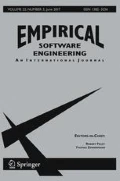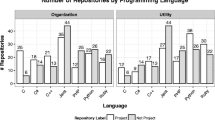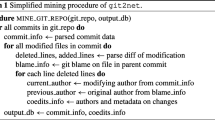Abstract
With over 10 million git repositories, GitHub is becoming one of the most important sources of software artifacts on the Internet. Researchers mine the information stored in GitHub’s event logs to understand how its users employ the site to collaborate on software, but so far there have been no studies describing the quality and properties of the available GitHub data. We document the results of an empirical study aimed at understanding the characteristics of the repositories and users in GitHub; we see how users take advantage of GitHub’s main features and how their activity is tracked on GitHub and related datasets to point out misalignment between the real and mined data. Our results indicate that while GitHub is a rich source of data on software development, mining GitHub for research purposes should take various potential perils into consideration. For example, we show that the majority of the projects are personal and inactive, and that almost 40 % of all pull requests do not appear as merged even though they were. Also, approximately half of GitHub’s registered users do not have public activity, while the activity of GitHub users in repositories is not always easy to pinpoint. We use our identified perils to see if they can pose validity threats; we review selected papers from the MSR 2014 Mining Challenge and see if there are potential impacts to consider. We provide a set of recommendations for software engineering researchers on how to approach the data in GitHub.







Similar content being viewed by others
Notes
A collection of open source software data, formerly known as OssMole.
ghtorrent associates a commit with the repository where it first sees it (table commits) and also links it to all repositories this commit has appeared into (table repo_commits)
http://rubyonrails.org GitHub repository located at https://github.com/rails/rails.
See http://pages.github.com/ for details.
We currently track all sources of commits in the Linux kernel: hydraladder.turingmachine.org
For the entire list visit https://help.github.com/articles/closing-issues-via-commit-messages.
The authors clarified this view in private communication.
References
Aranda J, Venolia G (2009) The secret life of bugs: Going past the errors and omissions in software repositories. In: Proceedings of the 31st international conference on software engineering, pp 298– 308
Bacchelli A, Bird C (2013) Expectations, outcomes, and challenges of modern code review. In: Proceedings international conference on soft engineering, ICSE ’13, pp 712–721
Bachmann A, Bird C, Rahman F, Devanbu P, Bernstein A (2010) The missing links: bugs and bug-fix commits. In: Proceedings of the 18th ACM SIGSOFT international symposium on Foundations of software engineering, pp 97–106
Baysal O, Gousios G (2014) The MSR’14 Mining Challenge., http://2014.msrconf.org/challenge.php
Begel A, Bosch J, Storey MA (2013) Social networking meets software development: perspectives from github, msdn, stack exchange, and topcoder. Software, IEEE 30(1):52–66
Bird C, Bachmann A, Aune E, Duffy J, Bernstein A, et al. (2009a) Fair and balanced?: bias in bug-fix datasets. In: Proceedings of the the symposium on the foundations of software engineering, pp 121–130
Bird C, Rigby PC, Barr ET, Hamilton DJ, German DM, Devanbu P (2009b) The promises and perils of mining git. In: Mining software repositories, (MSR’09). IEEE, pp 1–10
Bissyande TF, Lo D, Jiang L, Reveillere L, Klein J, Le Traon Y (2013) Got issues? who cares about it? a large scale investigation of issue trackers from github. In: 2013 IEEE 24th international symposium on software reliability engineering (ISSRE). IEEE, pp 188–197
Corbin J, Strauss A (2008) Basics of qualitative research: Techniques and procedures for developing grounded theory. Sage
Dabbish L, Stuart C, Tsay J, Herbsleb J (2012) Social coding in GitHub: transparency and collaboration in an open software repository. In: Proceedings conference on computer supported cooperative work, pp 1277–1286
Finley K (2011) Github Has Surpassed Sourceforge and Google Code in Popularity., http://readwrite.com/2011/06/02/github-has-passed-sourceforge
Gousios G (2013) The GHTorrent dataset and tool suite. In: Proceedings of the 10th Conference on mining software repositories, MSR ’13, pp 233–236. http://dl.acm.org/citation.cfm?id=2487085.2487132
Gousios G, Spinellis D (2012) GHTorrent: GitHub’s data from a firehose. In: MSR ’12: proceedings of the 9th working conference on mining software repositories, pp 12–21
Gousios G, Zaidman A (2014a) A dataset for pull-based development research. In: Proceedings of the 11th working conference on mining software repositories, MSR 2014, pp 368–371
Gousios G, Zaidman A (2014b) A dataset for pull-based development research. In: Proceedings of the 11th working conference on mining software repositories, MSR 2014, pp 368–371
Gousios G, Pinzger M, Av D (2014) An exploratory study of the pull-based software development model. In: Proceedings of the 36th international conference on software engineering, ICSE 2014, pp 345– 355
Gousios G, Zaidman A, Storey MA, Av D (2015) Work practices and challenges in pull-based development: The integratorĂŹs perspective. In: Proceedings of the 37th international conference on software engineering, ICSE 2015, to appear
Grigorik I (2012) The Github archive., http://www.githubarchive.org/
Howison J, Crowston K (2004) The perils and pitfalls of mining sourceforge. In: Proceedings of the international workshop on mining software repositories, pp 7–11
Kalliamvakou E, Damian D, Singer L, German DM (2014a) The code-centric collaboration perspective: evidence from GitHub. Technical Report DCS-352-IR, University of Victoria
Kalliamvakou E, Gousios G, Blincoe K, Singer L, German DM, Damian D (2014b) The promises and perils of mining github. In: Proceedings of the 11th working conference on mining software repositories, MSR 2014, pp 92–101
Kochhar PS, Bissyandé TF, Lo D, Jiang L (2013) Adoption of software testing in open source projects–a preliminary study on 50,000 projects. In: 2013 17th European conference on software maintenance and reengineering (CSMR). IEEE, pp 353–356
Marlow J, Dabbish L, Herbsleb J (2013) Impression formation in online peer production: activity traces and personal profiles in github. In: Proceedings of conference computer supported cooperative work, pp 117–128
Matragkas N, Williams JR, Kolovos DS, Paige RF (2014) Analysing the ’biodiversity’ of open source ecosystems: The github case. In: Proceedings of the 11th working conference on mining software repositories, MSR 2014, pp 356–359
McDonald N, Goggins S (2013) Performance and participation in open source software on github. In: CHI’13 extended abstracts on human factors in computing systems. ACM, pp 139–144
Neath K (2012) Notifications & stars., https://github.com/blog/1204-notifications-stars
Nguyen TH, Adams B, Hassan AE (2010) A case study of bias in bug-fix datasets. In: 2010 17th working conference on reverse engineering (WCRE). IEEE, pp 259–268
Padhye R, Mani S, Sinha VS (2014) A Study of External Community Contribution to Open-source Projects on GitHub. In: Proceedings of the 11th working conference on mining software repositories, MSR 2014, pp 332–335
Pham R, Singer L, Liskin O, Figueira Filho F, Schneider K (2013) Creating a shared understanding of testing culture on a social coding site. In: Proceedings of international conference on soft engineering, ICSE ’13, pp 112–121
Rahman F, Posnett D, Herraiz I, Devanbu P (2013) Sample size vs. bias in defect prediction. In: Proceedings of the 2013 9th joint meeting on foundations of software engineering, pp 147–157
Rahman MM, Roy CK (2014) An insight into the pull requests of GitHub. In: Proceedings of the 11th working conference on mining software repositories, MSR 2014, pp 364–367
Rainer A, Gale S (2005) Evaluating the quality and quantity of data on open source software projects. In: Proceedings of the first international conference on open source systems (OSS 2005), pp 29– 36
Rigby P C, Bird C (2013) Convergent contemporary software peer review practices. In: Proceedings of the 2013 9th joint meeting on foundations of software engineering, ESEC/FSE 2013, pp 202–212
Rigby PC, German DM, Storey MA (2008) Open source software peer review practices: a case study of the Apache server. In: Proceedings of the 30th international conferences on software engineering, ICSE ’08, pp 541–550
Sheoran J, Blincoe K, Kalliamvakou E, Damian D, Ell J (2014) Understanding ”watchers” on github. In: Proceedings of the 11th working conference on mining software repositories, MSR 2014, pp 336–339
Takhteyev Y, Hilts A (2010) Investigating the geography of open source software through github. http://takhteyev.org/papers/Takhteyev-Hilts-2010.pdf
Thung F, Bissyande T, Lo D, Jiang L (2013) Network structure of social coding in GitHub. In: 17th European conference on software maintenance and reengineering (CSMR), pp 323–326
Tsay J, Dabbish L, Herbsleb J (2014) Influence of social and technical factors for evaluating contribution in github. In: Proceedings of the 36th international conference on software engineering, ICSE 2014, pp 356–366
Tsay JT, Dabbish L, Herbsleb J (2012) Social media and success in open source projects. In: Proceedings of computer supported cooperative work companion, pp 223–226
Wagstrom P, Jergensen C, Sarma A (2013) A network of rails: a graph dataset of ruby on rails and associated projects. In: Proceedings of the 10th international work conferences on mining software repositories, pp 229–232
Weiss D (2005) Quantitative analysis of open source projects on sourceforge. In: Proceedings of the first international conference on open source systems (OSS 2005), pp 140–147
Acknowledgments
Author information
Authors and Affiliations
Corresponding author
Additional information
Communicated by: Sung Kim and Martin Pinzger
Rights and permissions
About this article
Cite this article
Kalliamvakou, E., Gousios, G., Blincoe, K. et al. An in-depth study of the promises and perils of mining GitHub. Empir Software Eng 21, 2035–2071 (2016). https://doi.org/10.1007/s10664-015-9393-5
Published:
Issue Date:
DOI: https://doi.org/10.1007/s10664-015-9393-5




